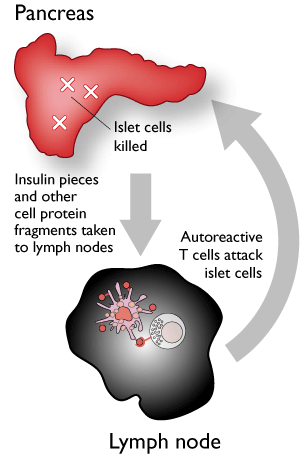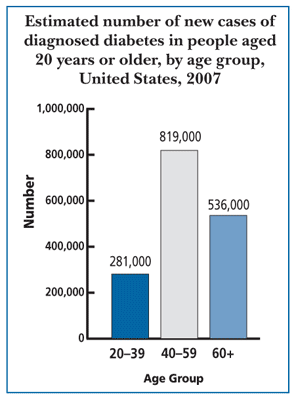Type 1 diabetes mellitus is one of these autoimmune diseases, and there may be hope for a new treatment for this condition which affects 8% of the American population. Based on a study conducted by researchers at the Linkoping University in Sweden, treatment with glutamic acid decarboxylase (GAD) in a standard vaccine could preserved the function of beta cells from further damage by the immune system. GAD is a known autoantigen found in significant amounts in patients with type 1 diabetes. The study suggests that treatment with GAD could preserve beta cell function by moderating immune system function and inducing a “tolerance” to the previously attacked cells.

In patients who have type 1 diabetes, GAD functions as an autoantigen and treatment with GAD could help modulate immune response and induce immune system tolerance in patients with recent onset. Photo credit: Illustration by Rachel Meyer, Harvard Focus
Published in the October volume of the New England Journal of Medicine, this study is crucial to the possible production of the world’s first diabetes vaccine. Their results suggest that autoantigen agents could be viably utilized as an alternative treatment to treat autoimmune diseases. Data from previous studies indicated that treatment with an autoimmune agent was possible and this notion was supported with the results found by Professor Johnny Ludvigsson, head researcher and lead author of the study and his team.
"The results show that treatment with [GAD] clearly has a positive effect on the course of type 1 diabetes, the most common serious, chronic disease among children," says Ludvigsson at Linkoping University Hospital, who is first author of the article and responsible for the study.

Diabetes Vaccine: The study, using active ingredient glutamic acid decarboxylase (GAD) was done in partnership with Diamyd Medical, who provided the GAD used in the study. Photo provided by Diamyd Medical
According to the study, “Autoantigens may be used to induce immunologic tolerance. Insulin and [GAD] are major autoantigens in patients with type 1 diabetes. A dose finding study in patients with latent autoimmune diabetes in adults indicted that a[n] injection with GAD in a standard vaccine might preserve residual insulin secretion without serious adverse effects” (Ludvigsson et. al.)
The study found that two injections of GAD will preserve beta cell function by adjusting immune modulation. “In our study, GAD induced an antigen-specific T-cell population with a broad range of cytokines involved in the regulatory process of the immune system. The treatment also induced a long-lasting, specific B-cell memory. Thus, modulation
of the general memory immune responses to GAD could be responsible for the beta-cell preservation” (Ludvigsson et. al.) This was most effect in patients who had been recently diagnosed with type 1 diabetes. Essentially, the treatment worked best in patients whose symptoms had started occurring within the past six months.

Statistics showing the new cases of diabetes by age group, in the U.S. Photo credit: National Diabetes Information Clearinghouse
Type 1 diabetes mellitus is an autoimmune disease in which the body’s immune system is triggered to attack specialized beta cells in the pancreas, which are responsible for producing insulin. The damage incurred by the immune system on these cells stops their production of insulin. Without insulin, uptake of glucose becomes increasingly difficult and then impossible as most or all of the beta cells are destroyed. If glucose stays in the bloodstream for prolonged periods of time, it can have dire consequences. Without proper uptake, the body cannot utilize the energy from the sugar to function properly. Insulin deficiency causes starvation of cells due to the lack of sugar, but also can cause extreme dehydration, blindness, high blood pressure, life threatening diabetic ketoacidosis, kidney disease and over long periods of time permanent damage to organs and extremities of the body due to nerve and blood vessel damage caused by blood thickening with too much glucose. Insulin must then be given intravenously to aide in the uptake of sugar from the bloodstream. But without the proper insulin regulatory functions of our beta cells, the risk of introducing too much insulin (hypoglycemia) or too little insulin (hyperglycemia) is high. Type 1 diabetes is usually diagnosed in people under 20 years old and affects 1 out of every 250 Americans. According to the American Diabetes Association, there are 23.6 million people in the United States with diagnosed diabetes as well as another 5.7 million more who are unaware that they have diabetes. There are an additional 57 million people in the U.S. who are exhibiting pre-diabetic symptoms.
Due to the positive results of this study, two other Phase III studies have been launched in Europe and the U.S. to test the vaccine on a large scale for safety and efficacy. These studies will examine the treatment applied to children and adolescents diagnosed with type 1 diabetes within the last three months.
The results from this study provide a new hope for the treatment and possibly prevention of type 1 diabetes. This study also gives us a more complete understanding of the action of autoimmune diseases in general and can provide us with new approaches for treatments for other autoimmune diseases.
References:
National Diabetes Information Clearinghouse (NDIC):



Comments